WOMEN'S MONTH OP-ED
Violence against womxn and feminisation of poverty is the problem – not immigration
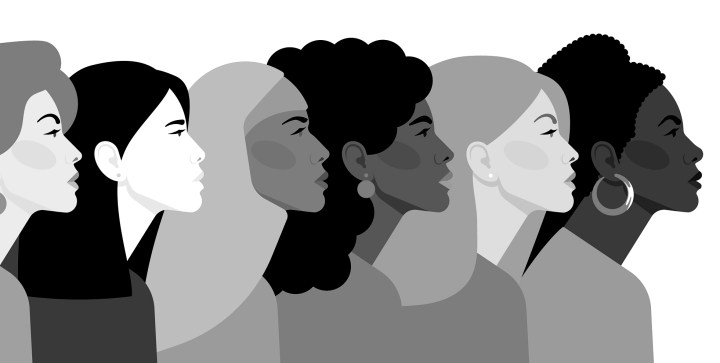
August 9 is intended to commemorate the day in 1956 when thousands of womxn marched on the Union Buildings to protest against apartheid pass laws. Sixty-six years later, as was the case under apartheid, womxn in South Africa still cannot move freely from one place to another without risking their lives and being raped.
As womxn, we are sick and tired of the horrors inflicted upon our bodies and minds. It is repugnant to think that these acts of barbarism against womxn and children in our country are now being used to justify xenophobia.
What is worse is that it has successfully shifted the attention away from the horror of rape and acts of gender-based violence and their real causes. Instead of uniting in our struggle against gender-based violence, communities are now consumed with acts of vigilantism and division.
We live in such a misogynist society that the lives of the womxn who were raped is already forgotten and used to advance political agendas.
After the rapes in Krugersdorp, police rounded up more than 80 people said to be in the country “illegally”, with sharp focus turning onto documentation status and illegal mining.
This is not helping us.

About 200 people gather outside Parliament to protest against gender-based violence on 28 November 2020 (Photo: Gallo Images / Brenton Geach)
The problem of the rapes is now being swept under a carpet of hatred for immigrants and informal miners without, to date, convincing evidence of holding those responsible for the rapes to account. Communities have vented their anger on any and every informal miner in the area, led by the local ANC branch, and police can now pretend that they have acted swiftly and firmly – but no womxn is safer.
The majority of rapes in South Africa are committed by South Africans, with research (see Youth and Adolescents’ Perceptions of Violence in Post-Apartheid South Africa: A Systematic Review of the Literature) locating gender-based violence to hegemonic masculinity, and male entitlement over women; linking this to apartheid.
The fact that this is often in our homes by our partners was starkly exposed during the first week of the Covid-19 lockdown in South Africa. According to published research, within one week of the lockdown, the South African Police Service (SAPS) reported a shocking rise in the number of gender-based violence cases – reportedly about 89,000 (see Review of exponential rise in domestic violence amid Covid-19: theories and perspectives)
Immigrant womxn at greatest risk
Immigrant womxn have always been at a greater risk of gender-based violence from authorities and gangs like the guma guma; now the frenzy against international migrants will make immigrant womxn even less safe than before. We saw postings on social media expressing views that Nigerian womxn should be raped – as if womxn are not people but possessions to be protected for “their” men or abused to punish “their” men.
And this is not only coming from the ground: a frenzy of state-sanctioned xenophobia has piggybacked on the events in Krugersdorp, such as “compliance raids” by the Department of Home Affairs.
We don’t need retribution and we don’t need scapegoating. We need prevention!
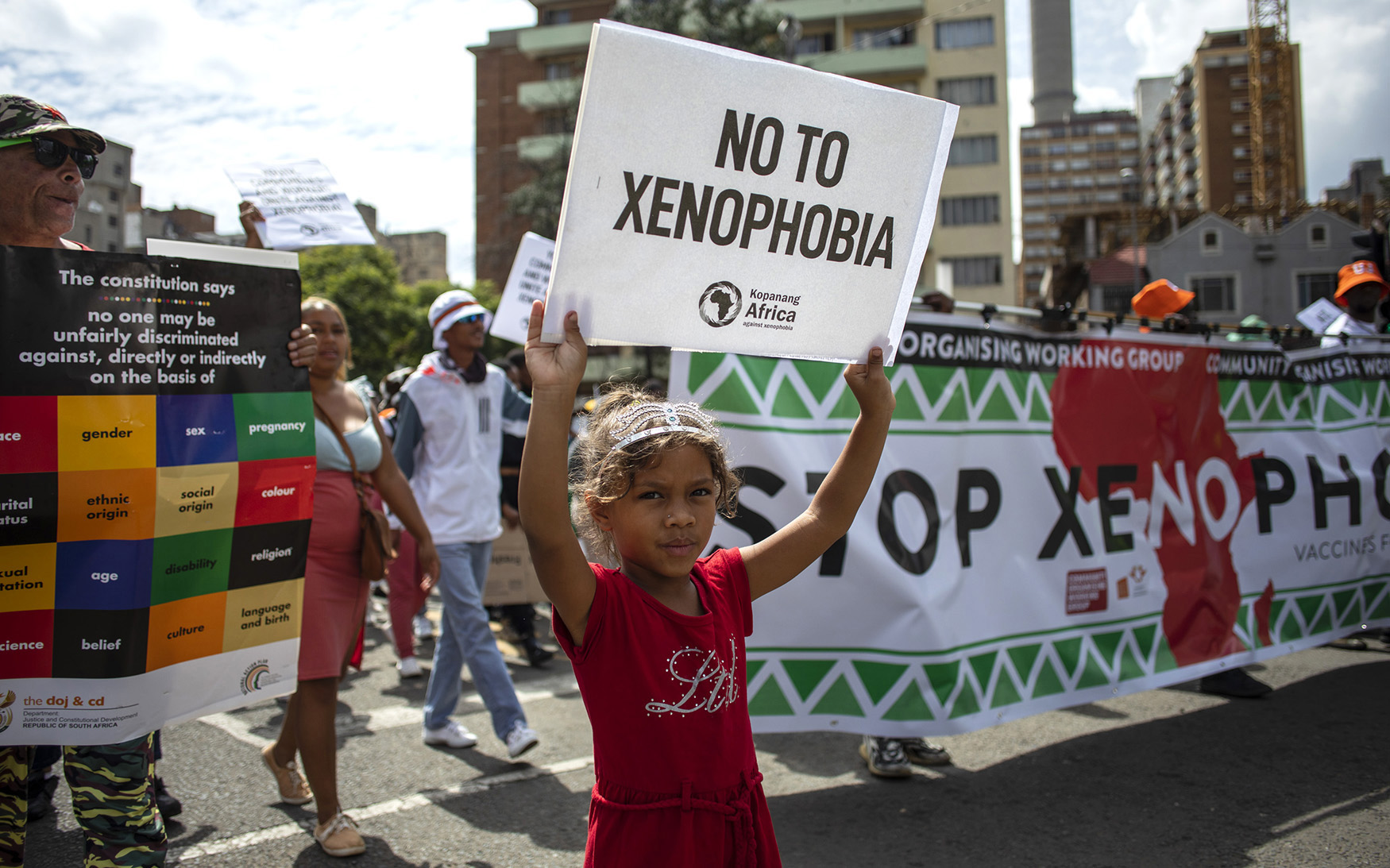
People take to the streets during a rally, organised by Kopanang Africa against Xenophobia, calling for an end to ‘xenophobic sentiments and groups’ in Johannesburg on 26 March 2022. (Photo: EPA-EFE / Kim Ludbrook)
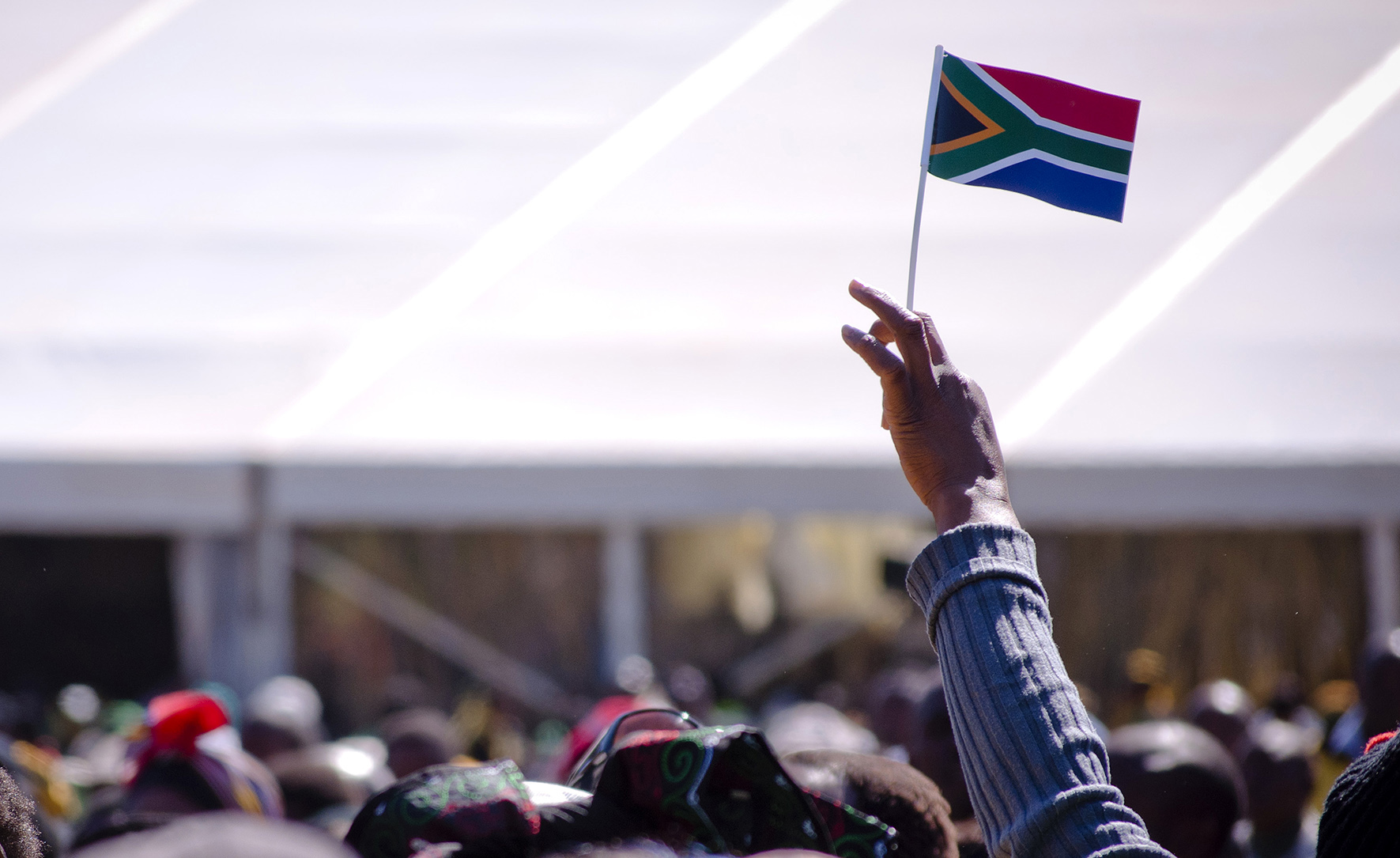
Women’s Day celebrations at the Union Buildings in Pretoria mark the 9 August 1956 march. (Photo by Gallo Images / Franco Megannon)
In his online newsletter to mark National Womxn’s Day in South Africa, President Cyril Ramaphosa took a very positive stance in “celebrating” the achievements of the ANC-led government in advancing the rights of womxn in this country.
The President did not express outrage that eight womxn were raped in Krugersdorp. This is because the government, the police force and predominantly male leadership in communities have “successfully” shifted the focus away from the fact that womxn have been raped and had their basic right to safe, free movement violated.
The President says: “… women can advance in any occupation, study in a place and field of their choice and own businesses. Thanks to employment equity legislation and other policies of the democratic government, women’s representation in the workplace, in government and all of society continues to grow.”
This is richly ironic in a country that is marked by the stigma of being the most unequal society in the world. He is celebrating gains that only a smidgen of middle-class womxn can lay claim to.
Visit Daily Maverick’s home page for more news, analysis and investigations
Black African working-class womxn continue, in the legacy of apartheid and colonisation, to bear the triple oppression of race, class and gender. The ANC spokesperson does not take his own party to task for failing womxn in our country. Instead he opportunistically calls for a march against migrants in South Africa. Fuelling xenophobic violence against our brothers and sisters of African descent! This delinquency takes place with impunity as the majority of political parties resort to populism to try to win votes.
In the case of the ANC, it is a desperate scramble to hold on to power.
The brutal war against womxn’s bodies continues unabated!
All political parties must take cognisance of the fact that, contrary to the President’s sentiments that the “prevalence of gender-based violence remains one of our biggest obstacles towards achieving full and meaningful gender equality”, the fact is that gender-based violence is systemic and structural, just as patriarchy is systemic and structural. Both these allied ills are destroying the very fabric of our society, and have left our democracy in crisis.

A protest against gender-based violence outside Parliament on 30 June 2020. (Photo: Gallo Images / Nardus Engelbrecht)
The solution is not just to colour Parliament with more womxn – the majority of whom have been catapulted into middle-class luxury and forget the plight of working-class womxn living in conditions of abject poverty in townships and so-called informal settlements, womxn who do not have the protection of “rapid response security” or high walls and who must use public transport to and from work.
The solution is to radically transform our society in terms of ensuring gender equality from the cradle to the grave, introduce egalitarian systems of solidarity and eradicate the evil system of capitalism that colludes with racism and patriarchy to introduce even more individual accumulation, hostility and violence towards womxn, the poor who are mostly black and the desperate, including migrants.
Xenophobia and sexism are products of a capitalist patriarchal society. Stereotypes about womxn are crafted into the criminal justice system, migrants are blamed for all social ills and law enforcement is prejudiced against foreigners.
The tiny percentage of rich people in South Africa are getting steadily richer, and the majority of black Africans living in this country are getting poorer. Most people are engaging in “precarious work” which comes with no protection, the majority of whom are black African womxn struggling for survival in the informal economy.
According to research by Oxfam in 2020 (Malikane, C, Reclaiming Power: Womxn’s work and Income Inequality in South Africa. Johannesburg: OZA) by 2019, half of black womxn earned less than R3,000 a month while half of CEOs (who are still mostly white men) took home more than R350,000 a month.
One of the reasons that rape and gender-based violence have reached pandemic proportions in South Africa is that very few perpetrators are arrested and charged with this crime. A report by the University of Cape Town found that the conviction rate in all reported rape cases is between 4% and 8%.
This is the brutal reality of the criminal justice system which, truth be told, has been very hostile to womxn and children in terms of rulings on gender-based violence and maintenance cases.
Yet the outcry in communities is not targeting the failed criminal justice system.
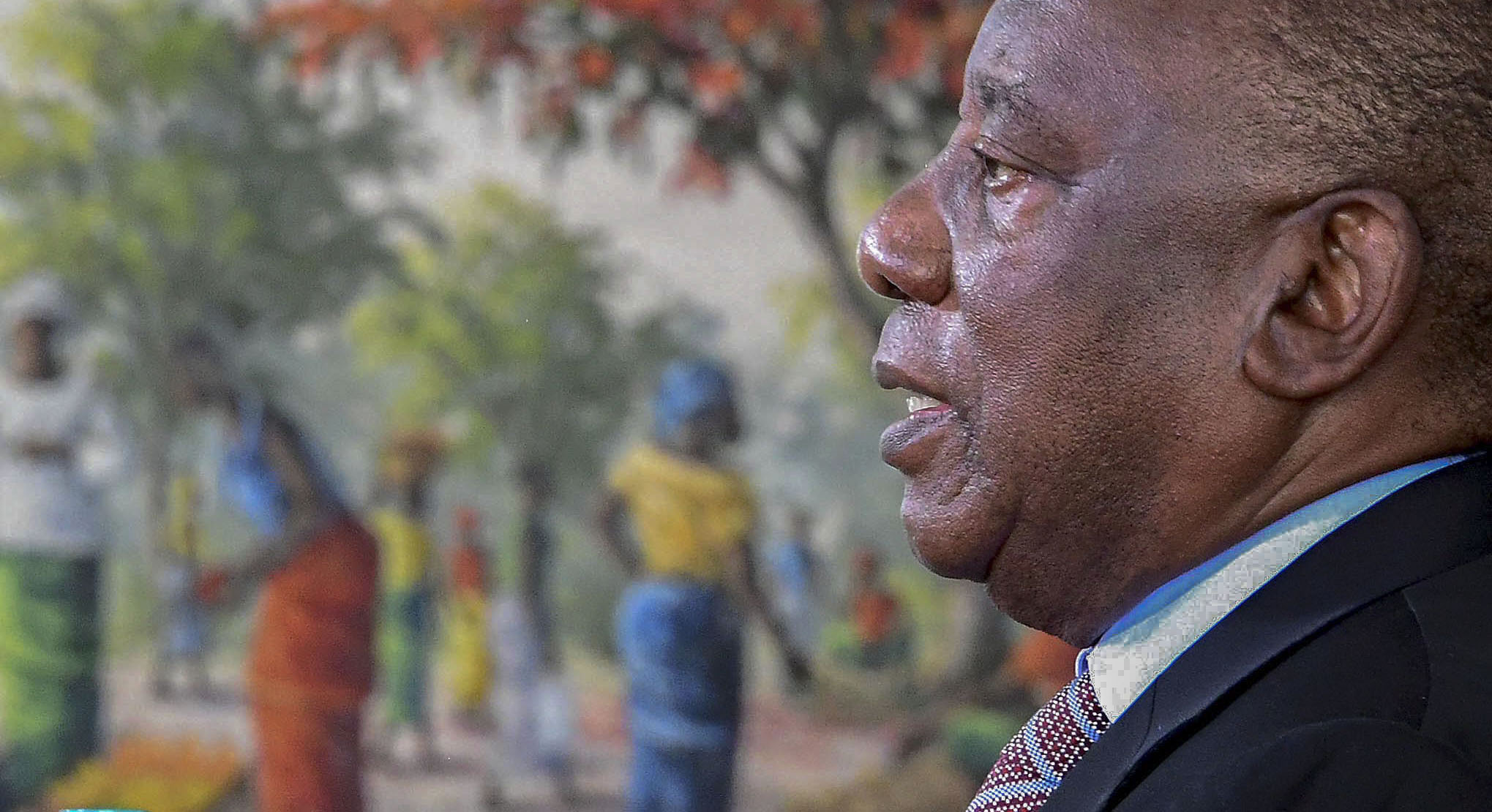
President Cyril Ramaphosa did not express outrage that eight womxn were raped in Krugersdorp. (Photo: Elmond Jiyane / GCIS)
Put in context, according to research, more than 1,000 womxn are raped in South Africa every day. About 150 will report the crime to the police. Fewer than 30 of these cases will be prosecuted and no more than 10 will result in a conviction.
Stereotypes of womxn result in cases being dropped or police not investigating and collecting evidence. Gender stereotypes and rape myths still influence prosecution and adjudication. The brutality of the failed system is revealed in the fact that in 2021 there were delays in DNA testing because of disputes with service providers, resulting in a backlog of 200,000 cases.
We would have to be convinced with hard evidence that this is not proof of a systemic and structural gender-based violence. Because of this, 200,000 gender-based violence survivors are subjected to the humiliation of delays without at the very least knowing that the perpetrator has been brought to book.
This is in a country where gender-based violence has been declared a national emergency.
Conditions that create rapists
Beyond the failing justice system, little or nothing is being done to challenge the conditions that create rapists.
We are also not satisfied with more efficiently filling up jails (with Black working-class and unemployed men, as powerful rapists tend to escape justice). We need peer programmes from school age that teach consent and that womxn are people too. We need to challenge stereotypes that womxn exist to serve men and which devalue so-called womxn’s work.
This should be accompanied by material valuation of “womxn’s work”, including better wages and security for all forms of care work, cleaning and so on, and a universal basic income grant of at least R1,500 a month, which would, among other things, recognise childcare and housework as essential to society rather than treating them as unskilled labours of love and biological destiny. These would also give womxn much more freedom to leave abusive relationships, jobs that involve unsafe travel, and unsafe housing.
We also need to challenge the stereotypes about men that position “good men” as providers, in a society that denies many people an opportunity to provide, and positions providers as the emperors of their households.
This means that we need to reduce the poverty, inequality, unemployment and consequent anxiety that also devalue Black working-class men’s lives, insecure work conditions and hierarchical relationships among men themselves, as well as the brutalising conditions in some townships; brutalised people are more likely to brutalise other people.
Xenophobia is also a product of a capitalist system which by its very nature foments divisions and discrimination to increase profits.
Xenophobia is scripted into every aspect of the management of refugees, asylum seekers and international migrants in our country. This is why we have people who are undocumented or whose documentation is irregular.
Home Affairs is led by an individual who is allergic to the truth as some migrants are undocumented only because the Home Affairs offices that process asylum seekers were closed throughout the the Covid period. He also does not acknowledge that millions of South Africans are undocumented because of that office’s below-par performance and lack of administrative justice.
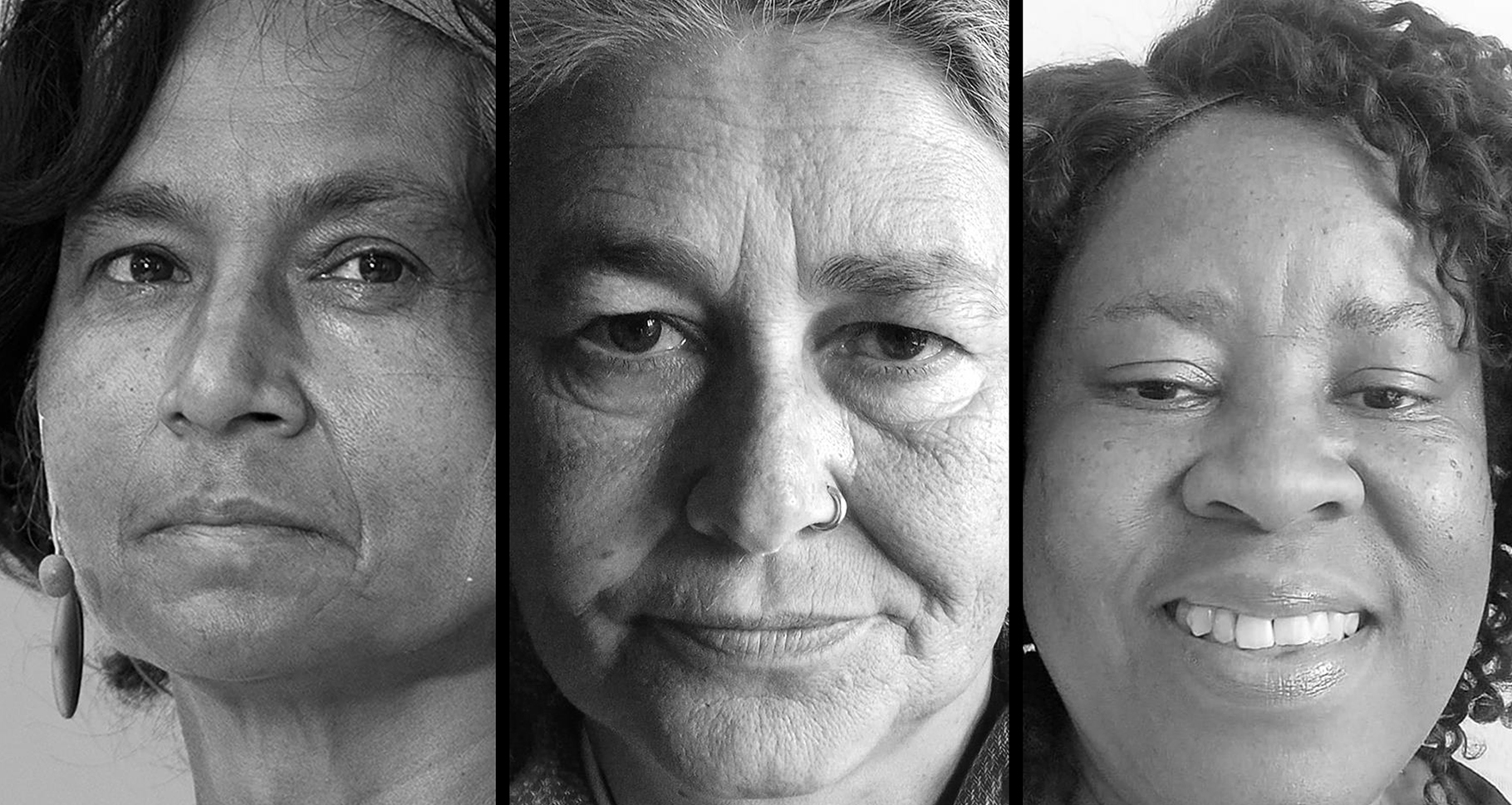
Sharon Ekambaram, Claire Ceruti and Fundi Nzimande
The ruling party, together with other political parties, has mastered the art of deflection. They celebrate when communities do not hold this government to account for systemic gender-based violence, systemic unemployment and ever-deepening levels of poverty, crime and related violence. Instead leaders who have failed to enforce policies to eradicate poverty and gender-based violence spout hatred and vitriol against migrants to distract us from holding them to account for their failings.
Meanwhile, the corporate sector is singing all the way to the bank, enjoying excessive profits by paying workers slave wages, compared with the millions they take home. Regulatory constraints have been removed, and this is defended with arguments that we are making South Africa lucrative for investment which will stimulate the economy.
New report reveals costly human and financial toll of gender-based violence on SA
In fact the opposite is happening: investment in mining is draining the country as profits are exported instead of being reinvested locally. Manufacturing not related to mining has all but collapsed in South Africa. It has also facilitated “hot investments” – short-term investment that leaves the country as quickly as it comes in, as soon as the opportunity for giant profits is used up, destabilising the economy and people’s lives. It is not translating into the creation of decent work and reduction in poverty. The rich get richer.
We are active members of Kopanang Africa Against Xenophobia. We call on all who live in South Africa to join us in mobilising our communities to target the government and the private sector. This is where resources are being pillaged. The greed and corruption of the government and the private sector are leaving millions in the country to live in horrendous conditions of poverty.
Dealing with these brutal conditions will be a crucial foundation for stemming gender-based violence and making South Africa safer for womxn. DM/MC
*The word womxn is inclusive of trans womxn and nonbinary people.
Fundi Nzimande’s gender and human rights activism has spanned student politics, trade unions and the women’s movement. She has served as a commissioner in the CEE and the CGE. She has written her first book on gender and leadership, Leading like a Woman, available on Amazon as a print or digital copy.
Sharon Ekambaram is a human rights activist and has been involved in the struggle for social justice through her work. She is part of the Treatment Action Campaign. She worked for the international medical humanitarian organisation Doctors Without Borders and was the founding director. She is head of the Refugee and Migrant Rights Programme at Lawyers for Human Rights.
Claire Ceruti is a member of Keep Left/Socialism From Below and was most recently active in Fees Must Fall/Outsourcing Must Fall at the University of Johannesburg, Clover Strike Support, and the Working Class Summit’s 24 August shutdown protesting against the high cost of living. She is about to submit a PhD at Wits.





















 Become an Insider
Become an Insider
Comments - Please login in order to comment.